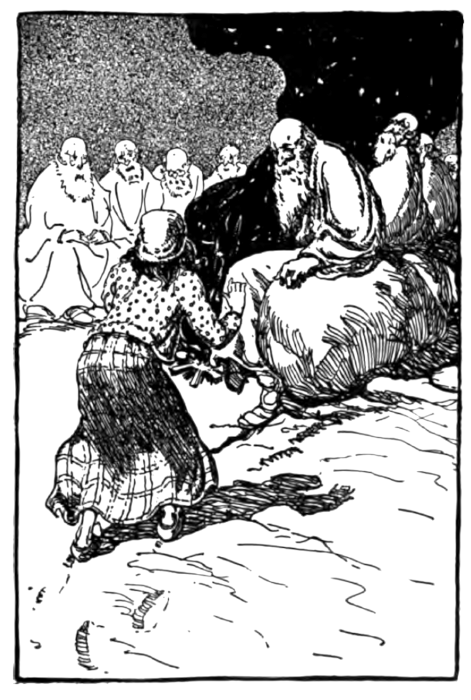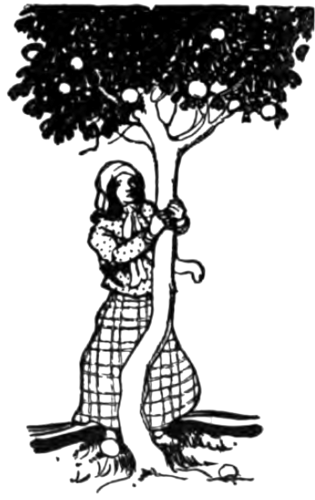| Web
and Book design,
Copyright, Kellscraft Studio 1999-2024
(Return
to Web
Text-ures)
| Click
Here to return to The Elm Tree Fairy Book Content Page Return to the Previous Chapter |
 (HOME)
|
|
THE
TWELVE MONTHS
THERE was once a widow who had a daughter Helen. In the cottage with these two lived a little servant girl named Margaret, who was very pretty and good, but whom the others disliked. They made her do all the hard work. She had to sweep the rooms, cook, wash, sew and spin, and she had to bring in the hay from the meadow and milk the cow. Helen, meanwhile, did nothing but dress herself in her best clothes and go to one amusement after another. But Margaret never complained. She bore the scoldings and bad tempers of the mother and daughter with the patience of a lamb. This seemed to make them the more tyrannical and grumpy, and at length they determined to get rid of her. So one day in the middle of winter Helen said she wanted some wood-violets. "Listen!" cried she to Margaret, "you must go up on the mountain and find some for me; and they must be fresh and sweet-scented." "But whoever heard of violets blooming in the snow?" said Margaret. "You wretched creature!" exclaimed Helen, "do you dare to disobey me? Not another word! Off with you, and don't come back without the violets!" The widow added her threats to those of Helen, and they pushed Margaret out of the cottage and shut the door on her. The weeping girl made her way to the mountain where the snow lay deep and there was no trace of any human being. Long she wandered hither and thither, and lost herself in the woods. She was hungry and shivering and almost ready to give up the struggle with the snow and cold when she saw a light in the distance. It was on the mountain top and she climbed toward it, and when she reached the summit she found a large fire burning and twelve men in long white robes around it, each seated on a block of stone.  Margaret and the twelve months There they all sat silently by the fire. They were the twelve months of the year. The great January was placed higher than the others and he was older than they. His hair and beard were perfectly white. In his hand he held a wand. At first Margaret was afraid, but after a while her courage returned, and drawing near she said, "Good men, may I warm myself at your fire? I am chilled by the winter cold." . The great January raised his head and asked, "What brings thee here, my child? What dost thou seek?" "I am looking for violets," replied the maiden. "This is not the season for violets," said January. "Dost thou not see the snow everywhere?" "Yes," was Margaret's response, "but the woman with whom I live and her daughter have ordered me to bring them some violets from the mountain. I dare not return without them, and I pray you, good sirs, to tell me where they may be found." Then the great January arose and went over to another of the months, and placing his wand in that month's hand, said, "Brother April, do thou take the highest place." April obeyed, and standing before the fire waved the wand over the flames. Immediately the flames rose far up toward the sky, the snow around melted, the trees and shrubs began to bud and the grass became green. It was like spring, and the woodland dells were blue with violets. "Gather them quickly," said April. Joyfully, Margaret hastened to pick the flowers, and she soon had a large bunch. Then she thanked the months and hastened home. Helen and her mother were amazed at the sight of the flowers, the scent of which filled the house. "Where did you get them?" asked Helen. "Under the trees on the mountain," replied Margaret. Helen took the flowers, but she did not even thank Margaret for the trouble she had taken. The next day she called to Margaret and said, "Run and fetch me some strawberries from the mountain, and see to it that they are sweet and ripe." "But whoever heard of strawberries ripening in the snow?" said Margaret. "Hold your tongue!" Helen retorted. "Go after the strawberries and don't come back without them." Helen's mother also ordered Margaret to go after the berries and pushed her out of the house and bolted the door behind her. The unhappy girl made her way to the mountain and climbed until she came to the fire around which sat the twelve months. "Good men," said she, "may I warm myself at your fire? The winter cold chills me." The great January raised his head and asked, "Why comest thou here? What dost thou seek?" "I am looking for strawberries," she replied. "We are in the midst of winter," said January. "Strawberries do not grow in the snow." "I know," said the girl sadly, "but the woman with whom I live and her daughter have ordered me to bring them some strawberries. I dare not return without them. Pray, good sirs, tell me where they may be found." The great January arose and went to a month opposite him, and putting his wand into that month's hand, said, "Brother June, do thou take the highest place." June obeyed, and standing before the fire waved his wand over the flames. Immediately the flames leaped far up toward the sky, the snow around melted, the earth was covered with verdure, the trees were green with leaves, birds began to sing and there were flowers blossoming in the forest. It was summer, and in the sunny glades were many ripe strawberries. "Gather them quickly," said June. Joyfully Margaret thanked the months, and having filled her apron hurried home. The sight of the strawberries was a great surprise to Helen and her mother. "Wherever did you get them?" asked Helen, crossly. "Up on the mountain," replied Margaret. Helen gave a few to her mother and ate the rest herself. Not one did she offer to Margaret. The next day she had tired of strawberries and took a fancy to have some apples. "Run, Margaret," said she, "and fetch me some fresh, red apples from the mountain." "Apples in winter!" exclaimed Margaret. "Why, the trees have not even leaves on them now." "You idle girl!" said Helen, "go this minute, and don't come back unless you bring the apples." As before, the widow added her commands and threats to those of her daughter, and seized Margaret roughly and turned her out of the house. The poor girl went weeping through the deep snow up the mountain till she came to the fire around which were the twelve months. "Good men," said she, "may I warm myself at your fire?" The great January raised his head and asked, "Why comest thou here? What dost thou seek?" "I come to look for red apples," replied Margaret. "But this is winter and not the season for apples," was January's response. "I know," said the girl, "but the woman with whom I live and her daughter have ordered me to bring them some red apples, and I dare not return without them. Pray, good sirs, tell me where the apples may be found." The great January arose and went to another month to whom he
handed his wand, saying, "Brother September, do thou take the highest
place."
"Gather the apples quickly," said September. The girl was delighted and ran and shook the tree. First one apple fell and then another. "That is enough," said September. "Now hurry home." She thanked the months and went down the mountain joyfully. Helen and her mother marvelled to see the fruit. "Where did you gather these apples?" Helen asked. "On the mountain-top," answered Margaret. "Why did not you bring more?" said Helen fretfully. "You must have eaten them on your way back, you wicked girl." "No, I have not even tasted them," declared Margaret. "I shook the tree twice. One apple fell each time. I was not allowed to shake it again, but was told to return home." Helen would not believe her, and spoke so harshly that Margaret wept bitterly and took refuge in the kitchen. Never had Helen and her mother tasted such delicious apples, and when they had eaten them they both longed for more. "Mother," said Helen, "give me my cloak and I will go for some more apples myself. I will not send Margaret because the good-for-nothing wretch would eat them on her way. I will find the tree, and no matter who cries 'Stop!' I shall shake it until I get all the apples I can carry." Her mother brought a cloak and a warm hood and helped her put them on. Then Helen took the road to the mountain while her mother stood at the window and watched her till she had disappeared in the distance. Snow covered everything in the woods, and not a human footprint was to be seen anywhere, but Helen pushed on until she reached the mountain-top. There was the fire and the twelve months seated about it. At first she was frightened and hesitated. Then she went nearer and warmed her hands. She did not ask permission, and the great January inquired severely, "What brought thee here? What dost thou seek?" "I came for apples," replied Helen. "Where is the tree? I am going to shake down all I can carry." January frowned and waved his wand over his head. Instantly the sky became covered with clouds, snow began to fall, and the fire and the twelve months disappeared. Helen was left alone in a wild storm on the mountain-top, and though she attempted to find her way home she wandered vainly hither and thither through the white forest. Meanwhile, her mother was constantly looking from the cottage window expecting her to return. The slow hours passed and the mother became alarmed. Then she put on her hood and cloak and went in search of her daughter. Snow fell in huge masses. It covered all things. The icy north wind whistled through the mountain forests, and mother and daughter never returned. Margaret dwelt in the cottage, and as no one had any better
claim to it than she, it became her property. In the course of time she
married, and her husband and she made the cottage their home, and continued
there contented and happy as long as they lived. |
 September obeyed and
stood in front of the seat which January had occupied. Then he waved the wand
over the fire. There was a flare of red flames, the snow around disappeared,
the trees budded and leaved out, and then the leaves began to brighten with the
tints of autumn, and many of them were scattered through the forest by a frosty
wind that began to blow. Margaret looked about and spied a little apple-tree,
the branches of which were hung with ripe, red fruit.
September obeyed and
stood in front of the seat which January had occupied. Then he waved the wand
over the fire. There was a flare of red flames, the snow around disappeared,
the trees budded and leaved out, and then the leaves began to brighten with the
tints of autumn, and many of them were scattered through the forest by a frosty
wind that began to blow. Margaret looked about and spied a little apple-tree,
the branches of which were hung with ripe, red fruit.